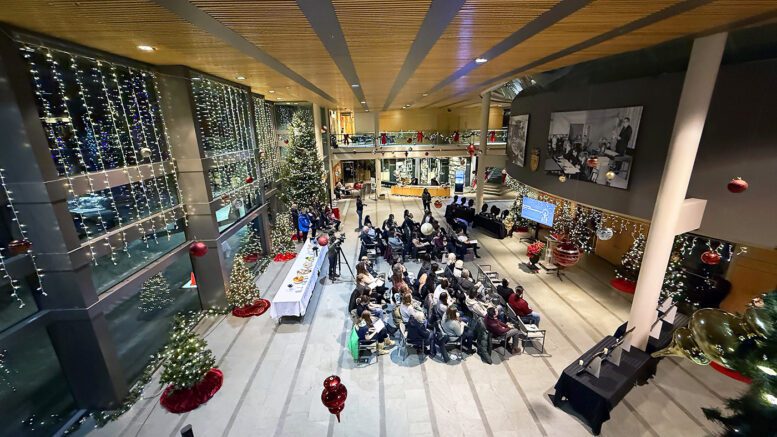Like so many Indigenous children whose parents went to residential school, Kate Wedzin grew up in an unhealthy environment that led to foster homes in her teens and abusive relationships as an adult.
Wedzin told a vigil marking the National Day of Remembrance and Action on Violence Against Women she learned as a child that her mother went to residential school in Inuvik and in Fort Smith.
“My mom struggles with substance abuse now. she doesn’t know how to handle her pain, so she drinks a lot almost every day, and she is always in toxic relationships, like many Indigenous children whose parents went to residential school grow up in an unhealthy environment,” Wedzin said on Friday night.
“I once stayed in an abusive relationship because I thought hitting, choking and slapping was love. I thought getting beaten up to the point of blacking out and seeing stars and almost dying was love. I was manipulated the same way my mom was manipulated.”
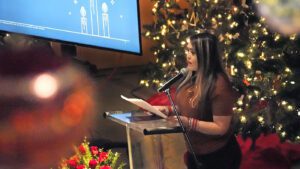
YWCA NWT board member Kate Wedzin shares her personal story of survival at vigil marking the National Day of Remembrance and Action on Violence Against Women December 6th in Great Hall of NWT Legislative Assembly. (James O’Connor/CKLB)
At 25 years old, Wedzin became pregnant and was sad and lost.
But she wanted to break the cycle of violence that she had experienced and found the healthy, supportive environment she needed at NWT YWCA.
She obtained housing, went to Aurora College, and is now on the board of directors with the YWCA.
“I am now a new homeowner, and I’m raising an amazing nine-year-old boy, breaking the intergenerational trauma by showing him love and affection and telling him I love him as many times in a day and giving him endless hugs with my husband alongside who has been very loving and patient with me while I still work through the traumas from my past,” she said.
“There are too many women who find themselves trapped in abusive relationships with nowhere to go, afraid to speak up, the rising cost of living, ongoing housing crisis and epidemic of mental health and addictions make all the problem much worse. Gender-based violence continues to be deeply rooted within the territory.
“I believe having healthier and safer communities as possible, we need to invest our time and resources to make changes within the society that will be better and uplift women and their families.”
The solemn ceremony Friday night in the Great Hall of the NWT Legislative Assembly was attended by 70 people.
Each December 6, such events are held across Canada to remember the 14 young women murdered in the 1989 Polytechnique Montréal tragedy and all those in the Northwest Territories who have experienced gender-based violence and those who we have lost to it.
Another Indigenous speaker was Lesa Semmler, who emotionally told her story about as a child in Inuvik, when she lost her 25-year-old mother to intimate-partner violence.
“I stand before you, but not as just an advocate, as a daughter of a victim who is gone because of intimate partner violence at the age of eight, after a horrific night of watching my mother be beaten in our home that had no walls,” she said.
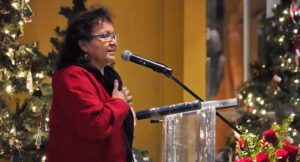
Louise Speakman offers prayer at start of vigil marking the National Day of Remembrance and Action on Violence Against Women December 6th in Great Hall of NWT Legislative Assembly. (James O’Connor/CKLB)
“She swept me up … in the middle of winter, to the church rectory, which was a makeshift shelter for women. I spent the night there with her, and the next day after her planning to get us out of there, we were to leave on the plane the next day.
“The next morning, as we walked towards our home, we walked by the school. It was morning. The kids were still playing outside. The bell hadn’t rung. I saw my friends in the playground. I was eight and I just wanted to go and say goodbye to my friends. So, I asked if I could just go to school, say goodbye to my friends, and she kissed me and said she’d be waiting for me at lunch.
“She never picked me up.”
Semmler said she was luckier than many children facing such emotional trauma, as her grandparents raised her in a loving home.
She went from a crushed and confused child, waiting in an Inuvik school yard on a cold January day to serving her community as a registered nurse, her region as a health-care administrator and, for the past year, as the NWT’s Minister of Health and Social Services.
Semmler said while her upbringing was filled with pain, it’s has also been a testament to resilience and hope. It instilled in her a deep desire to fight for those who are voiceless.
“The toll of intimate partner violence is overwhelming, and it doesn’t just affect the individuals involved. It ripples through families communities, leaving scars that last a lifetime. And I stand here today to remind you that behind every statistic is a human being. It’s someone’s sister, it’s someone’s brother, it’s someone’s mother, it’s my mother, it’s your mother,” said Semmler.
“But it’s our brothers and it’s our uncles and it’s our fathers that are doing this. Our men, our Indigenous men, have been displaced in this world, in this new world, and they need to find that place again. And we, as mothers and sisters and wives, we want that for our men. We want them to be strong, and we want them to stand beside us, strong and fight with us against this.
“We must be strong for them and encourage open conversation about mental health and emotional well being, we all need to support each other so we can create a space where we’re all safe to express our pain and seek help regardless of gender.”
In addition to the guest speakers, the evening featured a rose-laying ceremony in from of silhouettes of the 14 women killed 35 years ago, as live classical music played in the background, followed by a moment of silence.
The event was organized by the Status of Women Council of the NWT, The Native Women’s Association of the NWT, Yellowknife Women’s Society, NWT Disabilities Council, YWCA NWT and the Victims Assistance Fund.
December 6th is one of the 16 days of activism against gender-based violence, which began on November 25 the International Day for the Elimination of Violence Against Women, and it ends on December 10 International Human Rights Day.
If you need information on resources available for victims of gender-based violence, click here.
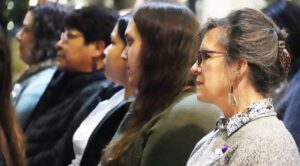
Lydia Bardak, victim services co-ordinator of the Native Women’s Association of the NWT, in audience at vigil marking the National Day of Remembrance and Action on Violence Against Women December 6th in Great Hall of NWT Legislative Assembly. (James O’Connor/CKLB)
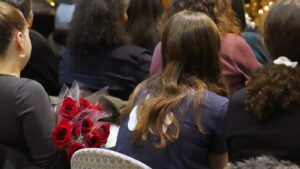
Members of the audience at vigil marking the National Day of Remembrance and Action on Violence Against Women December 6th in Great Hall of NWT Legislative Assembly. (James O’Connor/CKLB)
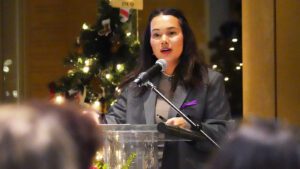
YWCA NWT board member Rami Kaur at vigil marking the National Day of Remembrance and Action on Violence Against Women December 6th in Great Hall of NWT Legislative Assembly. (James O’Connor/CKLB)

Members of the audience, including Yellowknife Mayor Rebecca Alty (wearing glasses), at vigil marking the National Day of Remembrance and Action on Violence Against Women December 6th in Great Hall of NWT Legislative Assembly. (James O’Connor/CKLB)
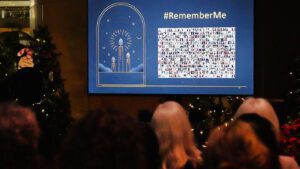
Photo collage show victims of gender-based violence at vigil marking the 2024 National Day of Remembrance and Action on Violence Against Women December 6th in Great Hall of NWT Legislative Assembly. (James O’Connor/CKLB)
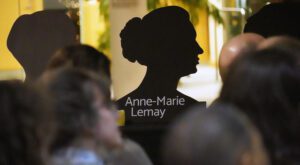
Silhouettes of the 14 shooting victims in Montreal were are front of audience at vigil marking the 2024 National Day of Remembrance and Action on Violence Against Women December 6th in Great Hall of NWT Legislative Assembly. (James O’Connor/CKLB)
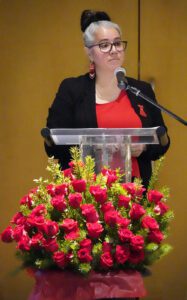
Health and Social Services Minister Lesa Semmler shares her story of survival at vigil marking the 2024 National Day of Remembrance and Action on Violence Against Women December 6th in Great Hall of NWT Legislative Assembly. (James O’Connor/CKLB)

NWT Legislative Assembly decorated for 2024 holidays. (James O’Connor/CKLB)

